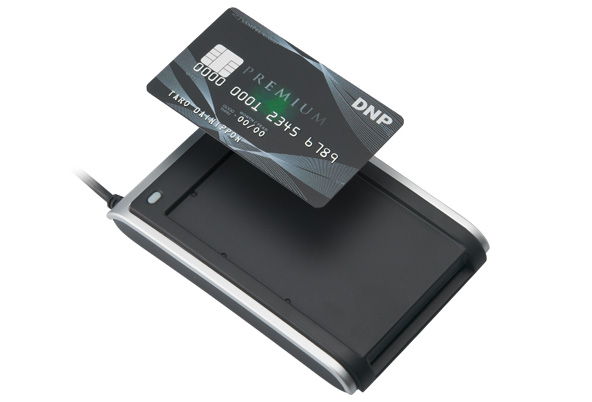
Smart-card troubleshooter envisions high-tech solutions, superior products
Whenever he encounters an impressive building while strolling down the streets of Tokyo, engineer Terunao Tsuchiya immediately draws up an architectural plan of the building in his mind’s eye. Similarly, when visiting an amusement park with his family, he perceives the rides as “cargo-transporting vehicles” and starts picturing diagrams for the structures—again, entirely in his head.
Though this may strike many people as a bizarre habit, Tsuchiya’s ability to visualize things that are concealed from the naked eye helped forge his in-house reputation as the man behind the success of Dai Nippon Printing Co.’s smart-card production business, helping transform it from an “encumbrance” into a “leading profit earner” nearly a decade ago.
“When you manufacture smart cards, the most important thing is whether you can imagine—based on logic and experience—what is happening inside the 0.76-millimeter-thick card,” Tsuchiya said, touching upon his mission to solve a nagging quality-control problem faced by DNP as it mass-produced the “plastic card equipped with a tiny computer.”
Arduous mission to improve IC communication

|
|---|
His mission started in 2006, when he was transferred to DNP’s state-of-the-art IC card production plant in Ushiku City, Ibaraki Prefecture, after a 12-year stint at what is now the DNP Technology Development Center.
At that time, DNP was trying to improve the contactless communication performance of smart cards, which had just begun circulating in the market. Tsuchiya headed a project team assigned to identify and resolve the issue.
“We had to identify the hidden defect in the smart cards as quickly as possible, because if users thought that our products weren’t very handy, it could adversely affect the future proliferation of contactless IC cards,” Tsuchiya said. His eight-member team searched literally day and night for six months to find the root cause, and, once identified, resolve it. “Most weekdays, we hardly went home,” he recalled.
“Inside a contactless IC card are an IC chip and an antenna, which are electrically connected with gold bumps,” Tsuchiya explained using photos taken by a scanning electron microscope (which uses a focused beam of high energy electrons to generate a variety of signals on a surface). “One of my team members discovered a tiny dent in the device that provides thermal press fitting to the chip and antenna. We believed the existence of the dent was making the press fitting insufficient, thus destabilizing contactless IC communication. Then, we discovered we could improve the smartcards’ durability by changing the device’s parts to a material that is difficult to deform, and by adequately controlling the temperature and pressure.”
DNP now prides itself on making one of the most durable smart cards in the world, enjoying a domestic market share of 55 percent* for credit cards and a nearly 80 percent share for bank cards. The company produces about 150 million** smart cards a year.
“In those days, I used to think about how to fix the problem all the time, and once, I was thinking so intensely that I tried to open the factory gate by holding a can of coffee to the sensor, instead of my ID,” he laughs. “But our efforts eventually paid off. I’m so glad I was able to contribute to turning DNP’s smart-card production into one of its pillar businesses.”
*manufacturing volume-basis
**order-volume basiss
*,**according to DNP figures
Finding ‘nails that stick out’

|
|---|
Tsuchiya was later promoted to a general manager position at the Ushiku Plant, where he supervised 50 engineers. During the interview, he provided a tip which might prove helpful for those in managerial positions:
“Most bosses want impeccable subordinates, but such engineers will be quickly snatched up,” he said. “I would value subordinates who excel in just one area; I would ignore all shortcomings the person has as a [Japanese] company employee if he or she has at least one brilliant point. My subordinate who found the dent in the antenna press-fitting device isn’t good at communicating with other people, but he has unparalleled observation skills. If our team merely comprised employees with no more than ordinary sense, we’d never be able to move forward.”
Tsuchiya’s stance might run somewhat counter to the Japanese traditional notion of “a nail that sticks out gets hammered in,” but his managerial skills appear to have been instrumental in making the smart-card breakthrough.
Discretionary powers granted to engineers, researchers

|
|---|
In fact, DNP has succeeded in a series of breakthroughs that have allowed it to diversify its operations thanks to its policy of giving its engineers and researchers a wide range of discretionary powers while pursuing their missions. Numerous companies have folded after failing to meet the challenges of new eras—but not DNP. It is no longer a mere printing company: its business domains cover electronics, lifestyle and industrial supplies, and even regenerative medicine, mostly using technologies that span out from its printing technologies.
DNP started producing smart cards in the 1980s, using its edge as Japan’s largest maker of magnetic stripe cards, which were widely used as credit cards and bank cards during the final decades of the last century, prior to the advent of smart cards. The firm’s technologies for magnetic stripe cards stem from those used in printing securities, gift vouchers and other items that must be counterfeit-proof.
DNP currently produces smart cards at three plants, including the Ushiku plant, which is often likened to a fortress, and where “even a single rat is not allowed to sneak in.” The windowless factory is fortified by layers of security controls—including fingerprint checks—and is meticulously designed to prevent any personal information contained in the cards leaking from the premises.
Eyes on Southeast Asian markets

|
|---|
DNP is also looking beyond the domestic market, particularly at Southeast Asian markets. However, it is difficult to export IC cards to other countries because it involves inputting personal data onto the cards. Thus, tie-ups with local firms are essential.
In 2014, DNP forged a business/capital tie-up with Vietnam’s top card and business forms maker/dealer, MK Smart Joint Stock Company, to develop the Southeast Asian markets for IC cards and related products. This year, DNP established a joint venture, PT. Wahyu DNP Bureau, with Indonesia’s largest card manufacturer, PT. Wahyu Kartumasindo International, providing a smart-card personalization service in Indonesia.
“Japanese products and services are meticulous and of high quality,” Tsuchiya said. “The specifications for smart cards are set by international standards, but DNP is transcending those standards and making perhaps the most durable smart cards in the world. Our aim is to create products that make for a more convenient and comfortable user experience.”
- *DNP department names, product specifications and other details are correct only at the time of writing. They are subject to change without prior notice.
October 21,2016 by DNP Features Editorial Department


